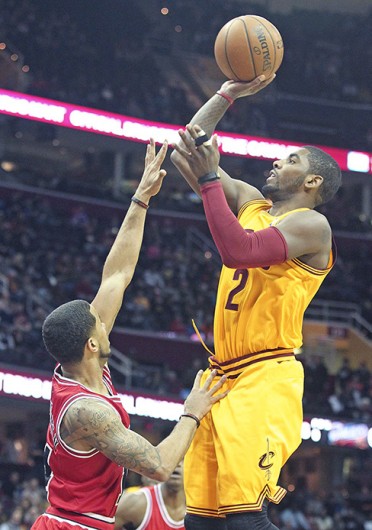
Cleveland Cavaliers guard Kyrie Irving attempts a shot during a game against the Chicago Bulls Jan. 22 at Quicken Loans Arena. The Cavaliers lost, 98-87.
Courtesy of MCT
On April 15, 2013, as the final buzzer sounded, he ran toward the locker room and wasn’t seen again for the rest of the evening.
It was simultaneously the final game of the 2012-13 season at Quicken Loans Arena for the Cleveland Cavaliers and “Fan Appreciation Night” — a night dedicated to the thousands of Clevelanders who watched the Cavs put together another atrocious campaign.
While many players stood on the hardwood following the game to toss their shoes, uniforms and promotional giveaways into the audience as a sign of their appreciation, Kyrie Irving could not be bothered.
All of a sudden, the 21-year-old prodigy, who offered a ray of hope following the departure of LeBron James, was Cleveland’s newest target and it showed throughout most of the 2013-14 Cavaliers season.
His 2014 All-Star Game MVP trophy paled in comparison to his ongoing feud with fellow first-rounder Dion Waiters.
His 20.8 points per game scoring average meant nothing, as he refused to cooperate with coach Mike Brown on the defensive end of the floor.
His on-court selfishness overpowered the slick moves to the hoop that earned him his 2012 Rookie of the Year trophy.
Seemingly disgruntled by his inability to appease the Cleveland fan base with his play, Irving had a decision to make with contract negotiations looming — or so he thought.
Irving’s decision was made for him by the Cavaliers, who collectively have done almost everything in their power to cater to the young superstar this offseason.
For starters, they fired their coach and, in one way or another, Irving’s apparent nemesis Mike Brown.
They then lucked their way into another first-overall selection in the NBA Draft, ensuring that Irving would have the opportunity to be joined by another young talent.
Next, they did their due-diligence when hiring a new coach and wound up with David Blatt, who, according to many, is one of the greatest offensive basketball minds in the world today.
These three moves all but sealed Irving’s fate, but the Cavs had one more move to make.
Rather than to wait or to force Irving to travel back to Cleveland to negotiate at midnight on Tuesday, Dan Gilbert, David Griffin, David Blatt and the Cavs contingency flew to New Jersey and were at his door as the clock struck 12, confirming that their No. 1 priority and the future of the franchise was none other than Kyrie Irving.
With the front office fully behind him, Irving quickly agreed to the max extension, making him a Cavalier for the next six years.
When he signs the dotted line on July 10 — the first day that players can officially sign contracts with teams — Irving will have erased all of the doubts that Clevelanders wrestled with for the past four years.
Is he committed to the team? Without a doubt.
Is he committed to the city? No question.
Is he committed to helping this team and this city win a championship for the first time since 1964? Absolutely.
At times, it seemed Cavs fans would once again be abandoned by a player who carried their hopes and dreams.
The story had a similar start, but the expected end now must be rewritten.


